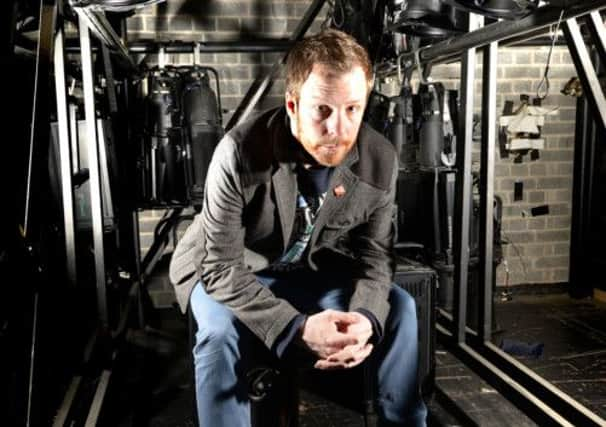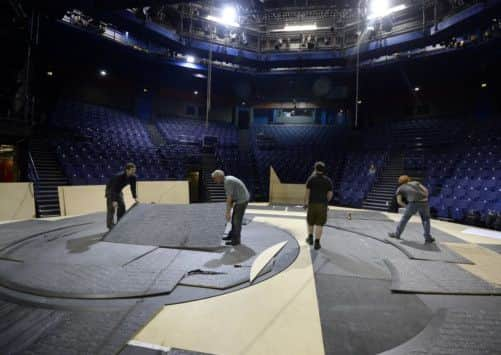Sherlock with magic in the air


Standing outside London’s Euston Square tube station like two good schoolboys, theatre director Nikolai Foster and production designer Michael Taylor await a call that will transport them into a unique and arcane world of the past.
A phone rings. A voice offers directions to a cobbled street flanked by old warehouse-style buildings. “Walk down. On your left you will see a door with a blue plaque with symbols on it. Ring that doorbell.”
Advertisement
Hide AdAdvertisement
Hide AdHuge doors open. Foster and Taylor step inside the hallowed portals of the Magic Circle to meet Scott Penrose, the master illusionist who they hope will transform a new stage production into a bona fide epic.


‘It was the weirdest day ever,” recalls Foster in between rehearsals of Sherlock Holmes – The Best Kept Secret at the West Yorkshire Playhouse in Leeds.
“In fact, Scott is weird. He just appears. When Michael and I went to the Magic Circle it felt like we had gone back in time to the 1890s. It’s extraordinary. We spent the whole day there. You never imagine for a second that you’ll be going into the Magic Circle as a student and that you’ll be learning how to...”
Foster pulls up short. There are things he witnessed – and things he has learned – that he cannot talk about without breaching a strict secrecy code. Suffice to say this is one addition to his theatrical CV that he could never have predicted.
Advertisement
Hide AdAdvertisement
Hide AdThis a new commission from Leeds writer Mark Catley that borrows from the Conan Doyle canon but emerges as a dark and sinister piece liberally soaked in Grand Guignol.
Jason Durr, formerly of Heartbeat and a leading man in waiting if ever there was one, plays Holmes. Andrew Hall is Watson. Adrian Lukis is Mycroft Holmes, Tanya Franks is Irene Adler and Victor McGuire is Inspector Lestrade.
In a production in which acting and artifice go hand in hand Durr and his fellow cast members not only perform alongside olde worlde illusions, they participate in some genuine chicanery. And all of it is live.
“Directors ask me for the impossible and I can deliver to them the almost impossible,” says Penrose, Vice President of the Magic Circle and a professional theatrical magician who regularly advises filmmakers and stage directors on delivering authentic magic.
Advertisement
Hide AdAdvertisement
Hide Ad“The rules say you can only teach magic to bona fide students and that’s through teaching or through books. An actor effectively becomes one of those students of magic if they need magic to be able to do their job. So I’m allowed to teach people like Nikolai or his cast because they have a bona fide goal in mind.”
Both Penrose and Foster are quick to point out that members can be expelled from the Magic Circle for exposing magic and its methodology. Indiscriminately giving away secrets puts members in ethical breach of the oath of secrecy they took on joining.
Those members include everyone from Paul Daniels and former racing driver Nigel Mansell to Prince Charles, who was proposed by Lord Mountbatten, himself a magic buff and Magic Circle member.
Sherlock Holmes – The Best Kept Secret is littered with what Foster describes as “honest trickery” in that it utilises the myriad facilities that might once have been found in the Victorian theatre.
Advertisement
Hide AdAdvertisement
Hide Ad“There’s a whole theme in the play about Sherlock not believing in the dark arts, which of course was a massive theme of the day,” says Foster. “Just as Sherlock doesn’t believe in religion so too he doesn’t believe in the occult. It’s presented to him at the beginning of the play by his brother as a fait accompli: that the dark arts do exist.
“Along the way in an old-fashioned music hall sort of way we have what I call the set pieces where the characters are led into these weird circumstances which are heightened and are unashamedly theatrical. That’s where the magic and jeopardy happens.”
On a tour of the Playhouse’s workshops there are glimpses of Taylor’s sets including what looks suspiciously like a guillotine. There is also a revolving stage that will present multiple scenes; a barred cell and much greyness that reflects the moodiness of the piece.
Penrose speaks of the golden age of magic – a period that lasted from 1890 to 1930 when exponents like Harry Houdini were active. Such practitioners staged gigantic shows that toured the United States. It is that style that Penrose has adopted for Catley’s play.
Advertisement
Hide AdAdvertisement
Hide Ad“A lot of it is based upon old magic. A lot of the technology that I use looks amazing but it’s based on really old technology. There’s one very specific thing we’re doing that can be traced back to a trick that was performed in the 1920s. It’s a very specific trick and very rarely seen because it is so huge. So it’s quite a responsibility. In a play you have to get it right first time because you can’t edit a play like you can a film. The actors get a crash course and it’s all very hands-on.”
And the guillotine? Penrose frowns. “They shouldn’t have shown you. I’ll have to speak to them about that.”
Some actors are adept with props. Some are not. Peter Cushing, who played a Byronic Holmes for Hammer Films in the late ‘50s was known as the Props Master for his dexterity with magnifying glasses, pistols, daggers, Bunsen burners and pipes.
How are Foster’s cast faring with live dialogue and live magic?
Advertisement
Hide AdAdvertisement
Hide Ad“It’s quite a boring answer: hard work. Jason has learned every single line before he came to rehearsals so on a very basic level he knows about 60 scenes in this play. It’s written like a movie script, which is very exciting for me. It’s fresh and original without wanting to challenge too much. Whether it’s the quick change of costume or handling magic it’s just hard work.”
He mentions an autopsy scene. “That’s one of Scott’s illusions. There will be two or three things where you think ‘Oh, that’s magic’ but in reality there will be a lot of other moments where we’ve used Scott which you hopefully won’t see. You won’t think ‘That’s a magic trick.’ You’ll just think ‘That looks gory. How the hell did they do that?’”
Clearly this is not the sort of Sherlock Holmes play we have become used to. But aside from Paul Giovanni’s The Crucifer of Blood, Jeremy Paul’s The Secret of Sherlock Holmes and David Stuart Davies’ Sherlock Holmes: The Last Act so many of the great detective’s theatre appearances have been pastiches or near-spoofs. Foster goes further.
“Without casting any negative aspersions on what’s gone before a lot of the theatrical productions you would at best describe as creaky. They feed off the stereotypical image that we have of Sherlock and the drawing room box set, very old-school, very traditional. So that’s what exists and we certainly didn’t want to do that.”
Advertisement
Hide AdAdvertisement
Hide AdBut more than that Foster, Taylor, Catley and the commissioning team at the West Yorkshire Playhouse wanted to send a message to those imposing cuts on the arts. “Rather than shy away from that and say we’ll produce less work and do things that already exist and things we know work, there’s something to be said – and I feel passionately about it – [which is] two fingers up to that. If we’re going to do something that has an existing thing around it let’s do it with a new play and a new writer. Let’s commission new work.”
Is it only coincidence that Catley’s play appears after two blockbuster (if seriously suspect) Hollywood movies, the BBC show starring Benedict Cumberbatch and the US spin-off headlined by Jonny Lee Miller? Foster smiles and reveals it was planned three years ago. What’s more it will be sufficiently original – even outlandish – to appeal to both the hardcore Sherlockian and the casual theatregoer. He’s aware that he’s making a statement, but one that he expects will set the box office alight.
“There’s only so many original things that you can do where it stops becoming a legitimate show in this slot. It starts to become the white elephant of the season where we’re really daring and all over the place with our casting, our production, our design and our writing and nobody’s watching it because it’s neither fish nor fowl.
“I don’t say we’ve gone into a middle ground because that immediately sounds boring. But I hope we’ve taken liberties in some places.
Advertisement
Hide AdAdvertisement
Hide Ad“I think our Sherlock is extraordinary. He’s eccentric and Jason is very traditional in some ways but he’s completely non-traditional in others. He’s very brave. He’s a leading actor who can fill a big space like that and give it the theatrical welly that it needs. But he’s also somebody who can be very dark and very frightening and isn’t afraid to inject drugs into his arm in the character he plays.
“So it is all of those things but we are trying to tick a lot of boxes in that we do unashamedly want to appeal to a wide range of people. We don’t want it to be so cool and so edgy and urban that it’s only young people, 20s and early 30s, who get our Sherlocky, grungy vibe. We wanted to have broad appeal.”
And a few tricks up their sleeves.
Sherlock Holmes – The Best Kept Secret, opens tomorrow (May 18), at the West Yorkshire Playhouse in Leeds. Website: www.wyp.org.uk. Box office: 0113 213 7700.